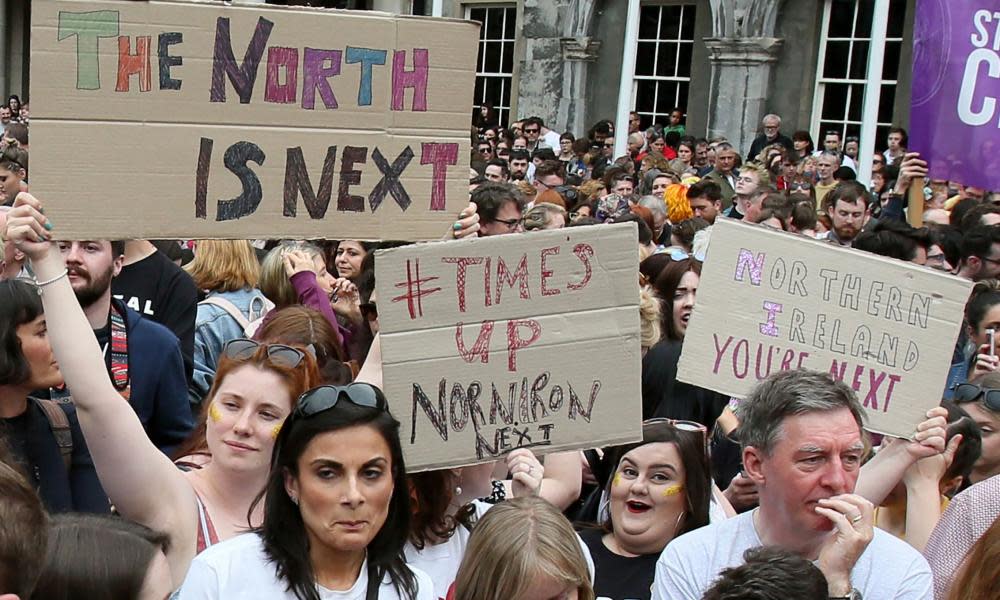The Guardian view on the Irish referendum: now for the North

The implications of the Irish referendum vote will be felt around the world. The most immediate effect must be in Northern Ireland: five Conservative women who have all been ministers for women and equality are urging Theresa May to override the DUP and significantly relax abortion laws there. They are right to do so, although she is resisting. The province’s absurdly strict law means rape, incest and fatal foetal abnormalities are not seen as valid reasons for termination. However, Ireland will now be looking to make an abortion law that reflects the 21st century – and so should the United Kingdom as a whole.
Labour MP Stella Creasy has proposed amendments to a forthcoming domestic violence bill which would provide a mechanism to do so. Abortion in the UK is framed by a 1967 statute which did not decriminalise termination but introduced a narrow exemption from the criminal law. Deeper reforms are needed and these must be extended across the UK. At the very least, women in England and Wales, like those in Scotland, ought to be allowed to take the abortion pill in their own homes. It is a fraught debate but on a free vote this will surely be carried. The home secretary, Sajid Javid, must provide MPs with a bill that would allow Ms Creasy’s amendments to relax abortion laws across the UK.
Friday’s vote was a ringing victory for humanity, for honesty, and for women’s rights; but what matters just as much is that it followed years of profound and thoughtful debate which led to voters reflecting and then changing their minds. That is the way that democracies are meant to deliberate. Politicians spoke clearly; some of them were brave enough to change their minds in public, but polling suggests that when it comes to questions of personal morality, people in both the UK and Ireland may pay less attention to politicians than to their own judgment and conscience. What changed minds, it seems, was often the long years of experience of what the absolute ban on abortion had meant in women’s lives. The personal really did become political reality.
A woman’s right to choose is not just a right over her own body. It is also, and at least as important, a woman’s right to choose what to believe and what to put her faith in. The right to choose what you believe is of course fundamental in any democracy. It is also what lies behind the collapse in the authority of the Catholic church in Ireland, which had dictated or attempted to dictate the relations between the sexes ever since the foundations of the state. Successive referendums on divorce, on equal marriage, and now on abortion, have shown how public opinion, and indeed the public sense of what is just and right, have shifted away from Catholic teaching. The power that the church had once exerted through its links with the state came to corrupt and then to destroy its moral authority when the abuses of that power came to light in the treatment of abused children and unmarried mothers.
The result should give heart to all those women (and men) in the US who resist the sometimes murderous campaign of the religious right against safe and legal abortion. It should be a beacon of hope to the women of Poland, where an authoritarian Catholic government which draws its strength from the countryside forces tens of thousands of women to travel abroad for abortions every year. But in Ireland, there was a majority for repeal in all but one rural constituency. The ultimate, profoundly liberating lesson of this vote is that when women, and men, have the right to choose, they will vote as their conscience tells them, not as authority directs.

 Yahoo News
Yahoo News 
